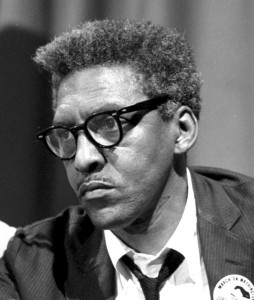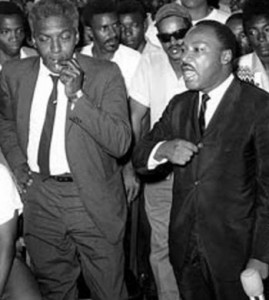 By Scott T. Allison and George R. Goethals
By Scott T. Allison and George R. Goethals
A number of heroes can be considered polymaths; these are individuals who excel in a number of different areas of life. Bayard Rustin was one such multi-talented person. Rustin was an accomplished tenor vocalist, a renowned scholar, and a versatile athlete. But Rustin’s most important contribution to the world may have been his life-long devotion to defending the rights of oppressed groups of people across the globe, especially in America during the Civil Rights movement of the mid-20th century.
As a young man in the 1940s, Rustin helped convince President Franklin Roosevelt to eliminate racial discrimination in defense industries and in federal agencies. He traveled to California to protect the property of Japanese Americans who had been wrongly imprisoned in internment camps. In the Deep South, Rustin was arrested for violating segregated seating laws on buses, a crime for which he served 22 days on a chain gang. Between 1947 and 1952, Rustin made frequent trips to India and Africa to meet with practitioners of Gandhi’s teachings about non-violent protest philosophies. His subsequent influence on Martin Luther King, Jr. was unmistakable. When Rosa Parks was arrested for bravely defying Jim Crow laws in Montgomery, Alabama, Rustin was there to advise King in practicing non-violent forms of protest, such as organizing the Montgomery Bus Boycott.
But Rustin was limited in the help that he could offer King. A gay man, Rustin lived in an era when homosexuality was unacceptable to the vast majority of Americans. During the Montgomery boycott, a reporter threatened to undermine King’s cause by exposing Rustin’s sexual orientation. King and Rustin agreed that their civil rights crusade would be best served if Rustin distanced himself from King.  Rustin was so careful not to undermine King’s work that he fled Montgomery at night in the trunk of a car. Still, Rustin continued to advise King and influence the civil rights movement in significant ways from a safe distance.
Rustin was so careful not to undermine King’s work that he fled Montgomery at night in the trunk of a car. Still, Rustin continued to advise King and influence the civil rights movement in significant ways from a safe distance.
It was not just the public and the media who felt threatened by Rustin’s sexuality. Many African American ministers involved in civil rights would also have nothing to do with Rustin, and some spread rumors that King was gay because of his close friendship with Rustin. Said Rustin, “Martin Luther King, with whom I worked very closely, became very distressed when a number of the ministers working for him wanted him to dismiss me from his staff because of my homosexuality. Martin set up a committee to discover what he should do. They said that, despite the fact that I had contributed tremendously to the organization. They thought I should separate myself from Dr. King.”
As the dream of racial equality made significant headway during the 1970s and 80s, Rustin was painfully aware of the lack of social progress in the area of gay rights. In 1986, he gave a speech entitled The New Niggers Are Gays, in which he asserted that “Blacks are no longer the litmus paper or the barometer of social change. Blacks are in every segment of society and there are laws that help to protect them from racial discrimination. The new ‘niggers’ are gays. It is in this sense that gay people are the new barometer for social change. The question of social change should be framed with the most vulnerable group in mind: gay people.”
Rustin devoted his entire life to promoting human rights, not only in North America but in other nations such as Haiti, Poland, and Zimbabwe. When asked to summarize his philosophy, he said, “The principal factors which influenced my life are nonviolent tactics; constitutional means; democratic procedures; respect for human personality; and a belief that all people are one.” As with many heroes, Bayard Rustin showed a courageous willingness to sacrifice his own well-being for the noble principle of equality. Throughout his entire life he remained a fierce advocate of civil rights for all people. “When an individual is protesting society’s refusal to acknowledge his dignity as a human being, his very act of protest confers dignity on him,” he said.
Below is a clip about Bayard Rustin’s contributions to the Civil Rights Movement.
You know, a lot of us try to be good people, live our lives according to humanistic principles, stand up for what’s right and promote greater appreciation and harmony in the world– but guys like Bayard Rustin always make us look like also rans. 😀 Imagine traveling all over the world to fight for human rights, advising great leaders, serving jail time for protesting unjust laws. That takes a level of guts and heroism above and beyond what most people could maintain.
It’s a tragedy that even in the midst of the Civil Rights Era that Gays were overlooked. More than 40 years after MLK, society is just starting to make real progress with Gay rights being recognized in a handful of states and slowly spreading (I’m proud to say that my state was the first). But the anti-gay factions are fanatical in the extreme– I know people who hold no prejudice toward any other group who swear that marriage equality will lead to civil war and that they will gladly fight.
I really don’t get why these extremists hold such a special hatred for homosexuals. It’s really not a big deal.
Thank you. I hope that your story will open a conversation
Thank you Scott and George for featuring this all-too neglected American Hero. There is a new documentary about Bayard Rustin that’s about to be released. It’s long past time that he gets the recognition he deserves. And for the rest of us, to realize that as long as any segment of our society is oppressed or otherwise denied their full rights, we are all in danger.
It is unfortunate that while everyone knows who Dr. MLK Jr. is, Bayard Rustin is frequently overlooked simply because of his sexuality, even though he was equally as instrumental to the success of the Civil Rights movement. Every year in school we learn about Dr. MLK Jr. and all of his accomplishments, but I do not recall the mention of Bayard Rustin’s name even once. This goes to show that heroes both big and small are often overlooked. So much of the news is spent highlighting the villains in the world that we seldom read or hear about those that are making society a better place. I’m glad that I was able to learn about Bayard Rustin and I commend him for his hard work in the fight for equality.
Bayard Rustin was a remarkable hero because he devoted his whole life in advocating for human rights in not only America but in other countries as well. His dedication in helping oppressed groups worldwide, shows that he was passionate about helping people from all walks of life.
His most influential contribution was during the Civil Rights Movement during the 1950’s-60’s. Bayard advised the King of a non-violent protest strategy in order to promote a vision of expectation for equality among blacks and whites. Though Rustin had to remain publicly distant from Martin Luther King to sustain King’s campaign, he is an extremely influential hero because he helped King in strategizing the proper way to steer the Civil Rights Movement. I do agree with the previous comments that it is a shame that one is more likely to hear about Martin Luther King in history courses, but not Bayard Rustin. I believe that Bayard Rustin’s contributions are extremely credible, and should not be overlooked based on his sexuality.
I think it is sad that Bayard Rustin had to basically abandon what he was dedicating his life to and something that he was so passionate about and believed in so much (the Civil Rights movement) just because he was gay. This makes him doubly a hero, because of the strides he made and the progress he helped create within the Civil Rights movement, and then making a personal sacrifice to separate himself from the cause for the good of the movement. I am glad that this blog is helping to commemorate Bayard Rustin and have his name live on.
Bayard Rustin was a remarkable man who gave the best of his life in the fight for Human Rights. Like many great Americans, Mr.Rustin didn’t allow his sexual orientation to limit his ability to work for Human Rights around the world. His detractors whether black or white have faded into the abyss of history but men and women of goodwill will always celebrate the achievements of Mr. Rustin. His work had a greater cause than personal recognition or fame. This is a lesson that we all should learn.